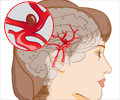Q: Which specialist should I consult to rule out intracranial hypertension?
A: You should consult a neurologist.
Q: I don’t have papilledema but have severe headaches. Can I have Intracranial hypertension?
A: Yes, you can have intracranial hypertension without papilledema, since it is the first stage of the same, wherein there is an impending pressure on the optic nerve but swelling has yet not come.
Q: Can intracranial hypertension affect children?
A: Intracranial hypertension is more likely to be secondary in nature resulting from some underlying cause rather than idiopathic. It has been found to most commonly affect the obese female population. It is less frequent in children less than 10years of age.
Q: Doctor found blind spots in patient’s eyes during examination. Does that mean progressive loss of vision?
A: Papilledema (swelling of the optic nerve) results in blind spots in the eyes and may cause transient visual obscuration but does not mean loss of vision. If treated on time, results in complete restoration of normal vision. But if left untreated, it might result in complete irreversible loss of vision progressively.
Q: Is lumbar puncture (LP) painful? What complications are associated with lumbar puncture?
A: Patient might feel slight discomfort during the administration of an anesthetic, when the same is injected in the back. But the discomfort is very minimal.
There is a very small chance of developing a headache after the procedure. This gets better with rest and fluid intake. Rarely, this headache may continue for more than 24 hours.








